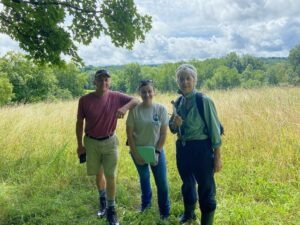 We will start to clear the foundations along the western boundary of the south field. We will be able to clear the fencing, dumping and other debris that hides some interesting historical features. Park at end of Stone Hill Road.
We will start to clear the foundations along the western boundary of the south field. We will be able to clear the fencing, dumping and other debris that hides some interesting historical features. Park at end of Stone Hill Road.
RSVP to our Conservation Chairs at conservation@trlandconservancy.org if you are interested in attending so that you can be contacted in case of changes or cancellations.
Join us to get hands-on experience clearing invasive plants. You will learn what plants are invasive to our area and how to treat them to hinder further growth.
We will be identifying and spray-painting common buckthorn in anticipation of cutting it later. Park along the road near 64 Orchard.
RSVP to our Conservation Chairs at conservation@trlandconservancy.org if you are interested in attending so that you can be contacted in case of changes or cancellations.
It’s a good idea to wear long pants, long sleeves, socks, sturdy shoes and work gloves. Bring water to drink, and loppers and a shovel if you have them.
This is a great opportunity to learn more about invasive plant species, their impact on wildlife habitats and how to manage invasive plant species. Registration is $85. The Land Conservation Committee has enough in its budget to sponsor two attendees. Please email Cathy at conservation@trlandconservancy.org if interested.
Enjoy an invigorating hike from Simsbury to Bloomfield co-sponsored by the Traprock Ridge Land Conservancy (TRLC), Simsbury Land Trust (SLT), and Bloomfield Parks, Recreation & Leisure Services. The free hike – now in its 11th year – will showcase TRLC, SLT, and town properties that provide trail connectivity linking the two towns through Penwood State Park. And the fall scenery should be gorgeous!
The hike will be approximately 5 miles. Meet at 9:00 a.m. at the hike’s end point, the Oliver Filley House in LaSalette Park in Bloomfield (120 Mountain Ave). (Google map) Bloomfield Parks, Recreation, and Leisure Services will provide a bus to shuttle hikers to this year’s starting point, SLT’s Tanager Hill property in Simsbury. SLT’s Walk Book notes that Tanager Hill is “the most diverse parcel” of preserved land in Simsbury.
The group will proceed through Tanager Hill to the yellow trail in Penwood State Park. In Penwood, hikers will visit Lake Louise and The Pinnacle for spectacular fall views of Simsbury and the Farmington Valley.
From there, the hike will proceed southeast to TRLC’s Stout Family Fields, Bloomfield’s gateway to Penwood State Park. From there we’ll do a short stretch on the road to reach TRLC’s Hawk Hill Farm property, a working farm with passive recreation trails and several notable trees, including a magnificent American elm. Hawk Hill adjoins Bloomfield’s LaSalette Park, where the trail will return the group to the historic Oliver Filley House and their vehicles.
We invite you to take advantage of this annual opportunity to experience a different mode of journeying between our two neighboring towns and enjoy the end of the fall color. RSVP to help us plan ahead. Thank you!
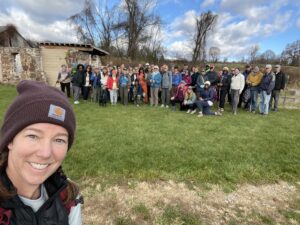


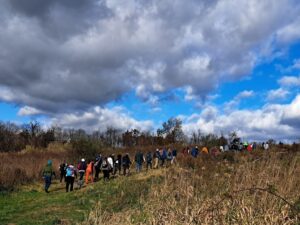


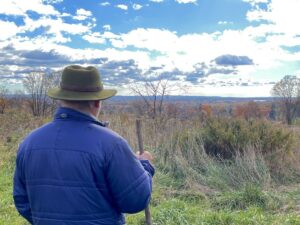


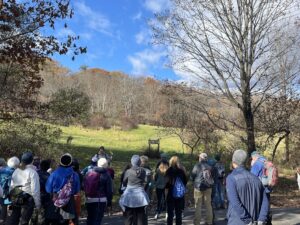


Interns and visitors are welcome to attend our October Land Conservation Committee Meeting at the Bloomfield Human Services Center building. We will go over property updates, policies we need to work on this winter, and start thinking about our budget.
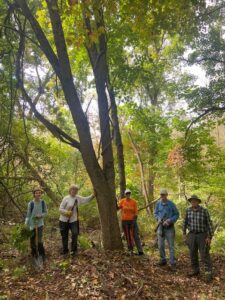


We will finish up work on the Notable Tree Trail. 20 Duncaster Road.
RSVP to our Conservation Chairs at conservation@trlandconservancy.org if you are interested in attending so that you can be contacted in case of changes or cancellations.
It’s a good idea to wear long pants, long sleeves, socks, sturdy shoes and work gloves. Bring loppers and water to drink.
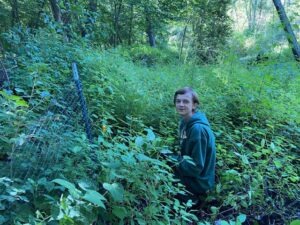


Co-steward Asher Scarlato will continue working on the new trail and bridge on the eastern side of the property. We will help Asher and cut and paint privet, bittersweet and multiflora rose. Across from 19 Pond Lane.
RSVP to our Conservation Chairs at conservation@trlandconservancy.org if you are interested in attending so that you can be contacted in case of changes or cancellations.
It’s a good idea to wear long pants, long sleeves, socks, sturdy shoes and work gloves. Bring water to drink, and loppers and a shovel if you have them.
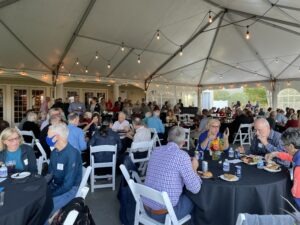


The Connecticut Land Conservation Council will be presenting our Excellence in Conservation award, recognizing the many hours of hard work spent over the past year in building our organization and caring for our properties. It’s sure to be a fun and informative evening:
- Enjoy hors d’oeuvres, sodas, beer and wine (or additional cash bar).
- Listen to live music and some very special entertainment.
- Learn about the organization and our recent progress and accomplishments.
- Learn how you can help us protect open space.
- Become a new member or renew your current membership.
Event registration for refreshments and drinks is $40 per person for members and $50 per person for non-members. Additional contributions are welcome (we are a 501c3 tax-exempt organization).
Please register by Friday, September 13:
- Register & contribute online now with a credit card.
- Or download and print a PDF form to mail-in with a check.
2024 Event Sponsors:
Connecticut River Level
Salmon Brook Level
Filley Pond Level
Learn how you or your organization can co-sponsor this event to support land conservation efforts in our communities: sponsorship fact sheet.
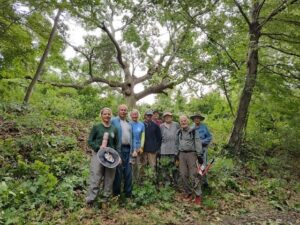


We will continue to clear under and around the notable trees along the trail at the farm at 20 Duncaster Road.
RSVP to our Conservation Chairs at conservation@trlandconservancy.org if you are interested in attending so that you can be contacted in case of changes or cancellations.
It’s a good idea to wear long pants, long sleeves, socks, sturdy shoes and work gloves. Bring water to drink, and loppers and a shovel if you have them.
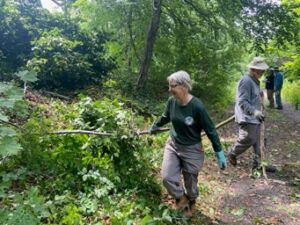


Join us at an invasive plant workshop to get hands-on experience clearing invasive plants. You will learn what plants are invasive to our area and how to treat them to hinder further growth.
At this workshop we will be cutting and painting winged euonymus and bittersweet. Park between 240 and 242 Tunxis Avenue.
RSVP to our Conservation Chairs at conservation@trlandconservancy.org if you are interested in attending so that you can be contacted in case of changes or cancellations.
It’s a good idea to wear long pants, long sleeves, socks, sturdy shoes and work gloves. Bring water to drink, and loppers and a shovel if you have them.
